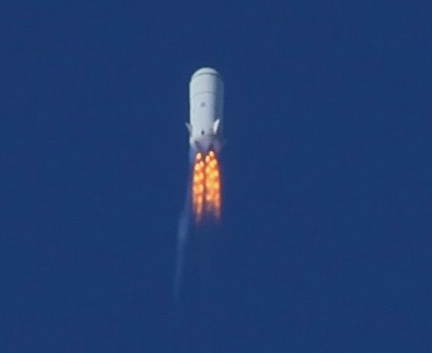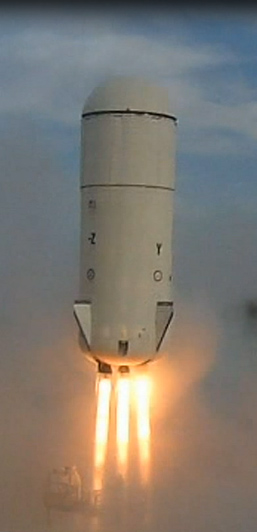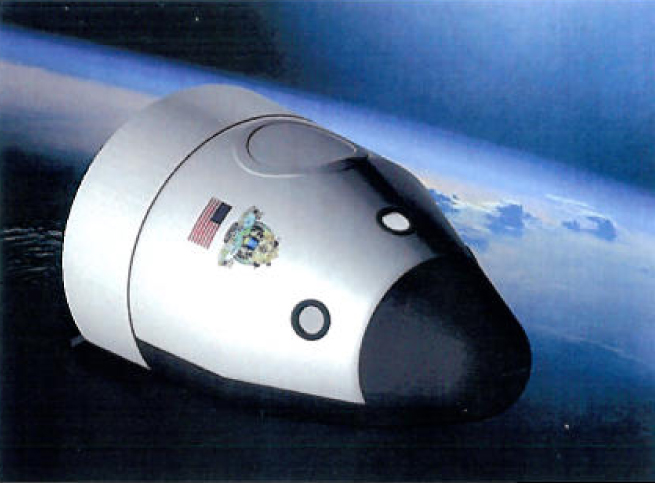Secretive Private Spaceship Builder Reports Rocket Failure


Blue Origin, the private entrepreneurial space group backed by Amazon.com mogul Jeff Bezos, has reported a failure in its suborbital rocket development plans.
"Three months ago, we successfully flew our second test vehicle in a short hop mission, and then last week we lost the vehicle during a developmental test at Mach 1.2 and an altitude of 45,000 feet," Bezos wrote in a statement posted to the Blue Origin website today (Sept. 2).
According to Bezos, a "flight instability" drove an angle of attack that triggered the Blue Origin range safety team to terminate thrust on the vehicle. The vehicle roared skyward from the Blue Origin spaceport, located roughly 25 miles (40 kilometers) north of tiny Van Horn, Texas, before the failure. [Photos: Blue Origin's Secretive Spaceship Test Flights]
"Not the outcome any of us wanted, but we're signed up for this to be hard, and the Blue Origin team is doing an outstanding job. We're already working on our next development vehicle," Bezos reported.
The tight-lipped Blue Origin space company has been focused on suborbital spaceflight, first using its Goddard vehicle and then migrating to the New Shepard spacecraft design at its facility in Culberson County, Texas. New Shepard is seen by the company as supporting the commercial suborbital tourist market. The Goddard vehicle flew a on a short, successful test flight in November 2006.
In April 2011, NASA awarded Blue Origin $22 million in funding under the space agency's Commercial Crew Development (CCDev) program for development of concepts and technologies to support future human spaceflight operations. That award followed $3.7 million in funding the company received in 2010 to develop an astronaut escape system and space capsule for ground tests.
NASA retired its space shuttle fleet in July and plans to rely on U.S. commercial spacecraft like those being developed by Blue Origin and other private space companies to transport American astronauts to low-Earth orbit.
Breaking space news, the latest updates on rocket launches, skywatching events and more!
While the test vehicle that failed last week was a suborbital vehicle, Blue Origin is also developing an orbital space capsule designed initially to launch on an expendable Atlas 5 rocket, then transition to a reusable booster being developed by the company.
"In case you’re curious and wondering 'where is the crew capsule,' the development vehicle doesn't have a crew capsule … just a close-out fairing instead," Bezos added in a postscript to his website update. "We're working on the sub-orbital crew capsule separately, as well as an orbital crew vehicle to support NASA’s Commercial Crew program."
Apparently undaunted by the rocket failure, Bezos ended his report with: "Gradatim Ferociter!"
That's Latin for "Step-by-Step, Ferociously."
Leonard David has been reporting on the space industry for more than five decades. He is a winner of this year's National Space Club Press Award and a past editor-in-chief of the National Space Society's Ad Astra and Space World magazines. He has written for SPACE.com since 1999.

Leonard David is an award-winning space journalist who has been reporting on space activities for more than 50 years. Currently writing as Space.com's Space Insider Columnist among his other projects, Leonard has authored numerous books on space exploration, Mars missions and more, with his latest being "Moon Rush: The New Space Race" published in 2019 by National Geographic. He also wrote "Mars: Our Future on the Red Planet" released in 2016 by National Geographic. Leonard has served as a correspondent for SpaceNews, Scientific American and Aerospace America for the AIAA. He has received many awards, including the first Ordway Award for Sustained Excellence in Spaceflight History in 2015 at the AAS Wernher von Braun Memorial Symposium. You can find out Leonard's latest project at his website and on Twitter.


